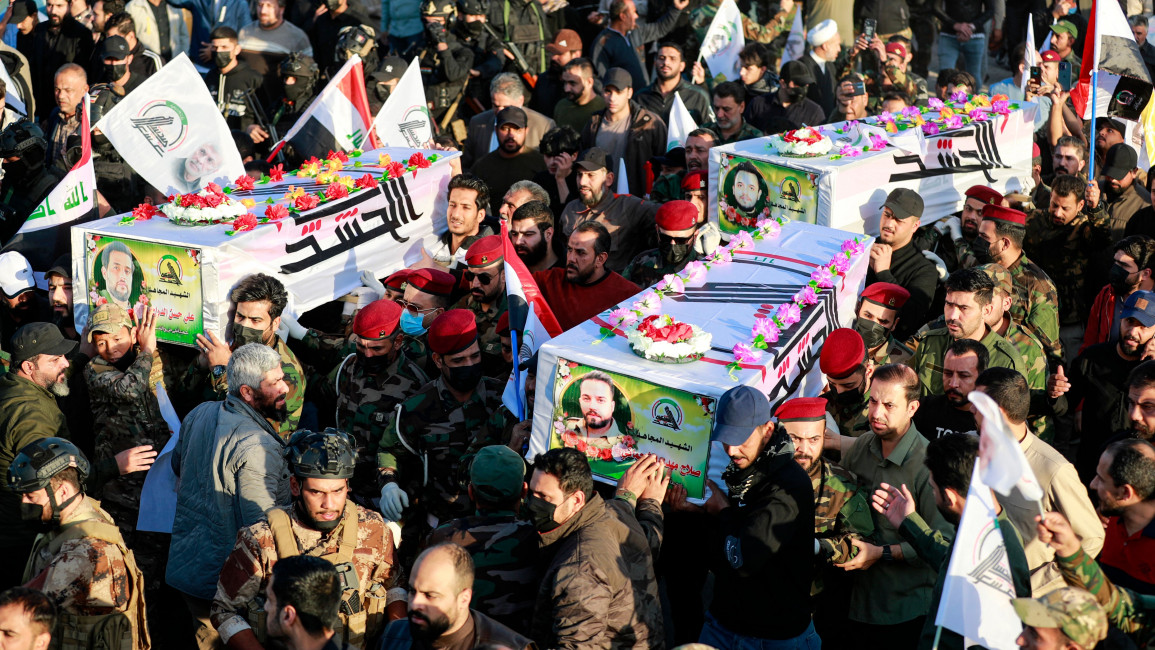Iraqi observers warn US ready for 'forceful response' to embassy attacks
The US will powerfully respond to the Iran-backed militias if they repeat targeting the US embassy in Baghdad, Iraqi political observers warn as militia leaders vow attacks on US targets will continue.
"I do not think the US will respond or target the Iraqi militias for now, and the proof to this is the call between Austin and Sudani was only a warning," Kazim Al-Jaheshi, an Iraqi analyst on political and security affairs, told The New Arab. "I deem the call was a warning message from the US that Washington will respond, and its response will be powerful if the Iraqi militias continue targeting the US embassy in Baghdad."
In what appeared to be the largest attack of its kind in recent memory, several mortar rounds landed in the US embassy compound in Baghdad early on Friday, 8 December, a US military official told Reuters.
Following the attack, which did not lead to any casualties, US Defense Secretary Lloyd Austin held a phone call with Iraqi Prime Minister Mohammed Shia al-Sudani, in which both men denounced the attack.
We strongly condemn the rocket attack on U.S. Embassy Baghdad last night. Prime Minister Sudani and the Iraqi government must to do all it can to protect diplomatic missions, our military personnel, and stop these attacks. https://t.co/LxP2V7zbLo
— Matthew Miller (@StateDeptSpox) December 8, 2023
"While Austin said the US reserves the right to act in self-defence against those launching any attack against US personnel," Sudani has warned against taking any direct response to militia attacks without approval from Baghdad, according to two formal statements from The Pentagon and Iraqi the prime minister's office.
"The Iraqi PM reiterated during the conversation the government's commitment to protecting diplomatic missions and individuals within the international coalition mission and its facilities and that the security apparatus is capable of pursuing and exposing those involved in these attacks, whoever they may be," read the statement by Sudani's office. "At the same time, he cautioned against direct retaliation without government approval and stressed the importance of not repeating the incident in Jurf al-Nasr."
The New York Times on Saturday reported that Jurf al-Nasr is controlled by Iraq's Khataib Hezbollah (KH), and it operates as a "forward operating base for Iran," citing sources from Western and Iraqi intelligence, military officers, and diplomats.
Major General Yahya Rasoul, Iraq's army spokesperson, in a statement on Saturday, 9 December, said Sudani had ordered security forces to investigate the embassy attack and that he replaced the regiment in charge of security in Baghdad's highly fortified Green Zone area where the attacks occurred.
"Security measures will be resolute against the elements that committed this terrorist act, and they will be subject to the law, especially since the specialized security agencies have obtained significant leads about them," Rasoul added. "The security forces have been granted extensive powers to immediately confront any action that threatens the security of diplomatic missions and the locations of international advisers, with no tolerance for such matters whatsoever."
The Iraqi political analyst Mujahid Al-Taie anticipated an American response to the Iraqi factions. "It is expected that the United States will strike the mentioned militias in response to the attacks, especially after their attacks were labelled as terrorist by Sudani, and this is a green light [for the US to launch airstrikes against the militias]," he stated in a post on X social media platform.
No one has claimed responsibility for the attacks, but Iraqi militias aligned with Iran are blamed for launching the attacks.
But KH said the facility was a base involved in planning military operations. Those who described it as a diplomatic mission were "subservient" and self-interested, Abu Ali al-Askari, a security official from the group, said in a social media post on Saturday.
US officials have reported more than 80 attacks against US interest in Iraq and Syria since mid-October, most claimed by an umbrella group of Iran-aligned Iraqi militias over Washington's backing of Israel in its war in Gaza.
The US has retaliated using drones and airstrikes. On 22 November, US warplanes targeted pro-Iran fighters in Jurf al-Nasr (formerly Jurf al-Sakhar) in northern Babil province, leading to the death of eight members of the Popular Mobilization Forces (PMF or Hashd al-Shaabi). Subsequently, an additional five PMF fighters were killed in a US drone strike in Kirkuk on 3 December.



